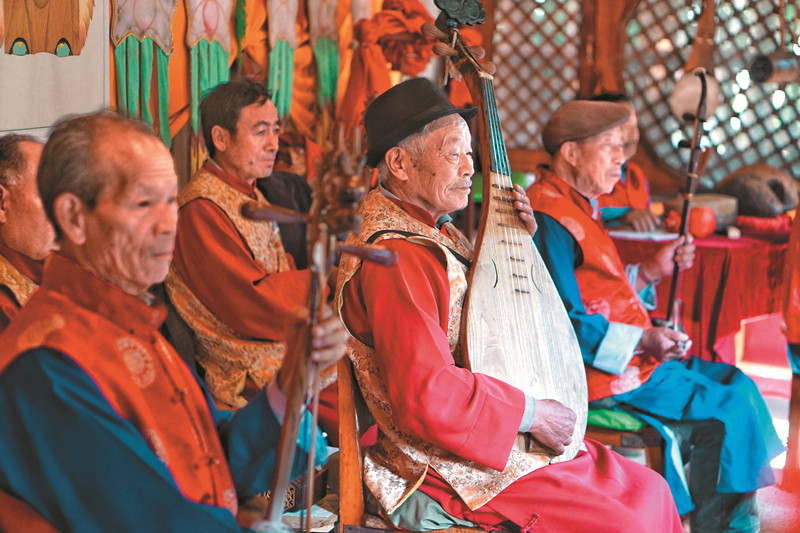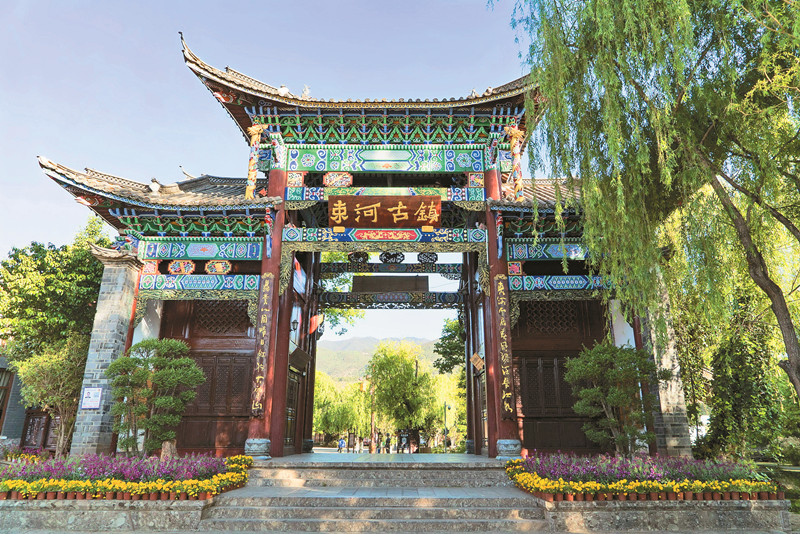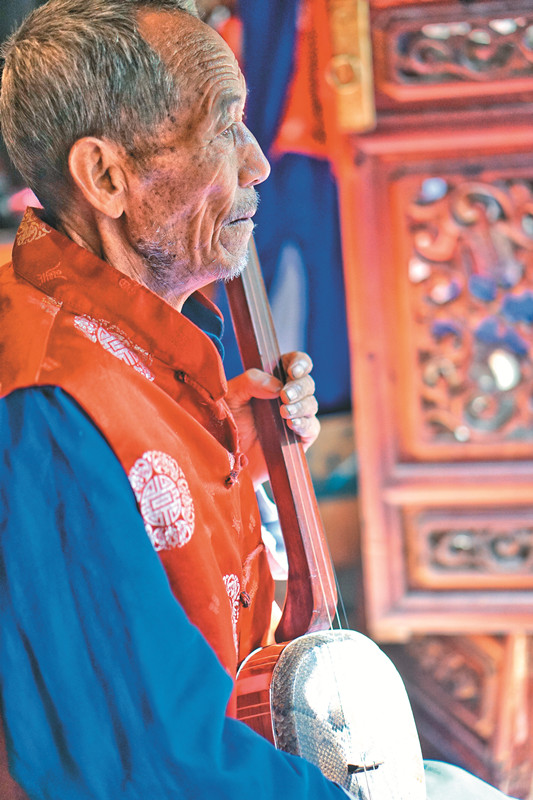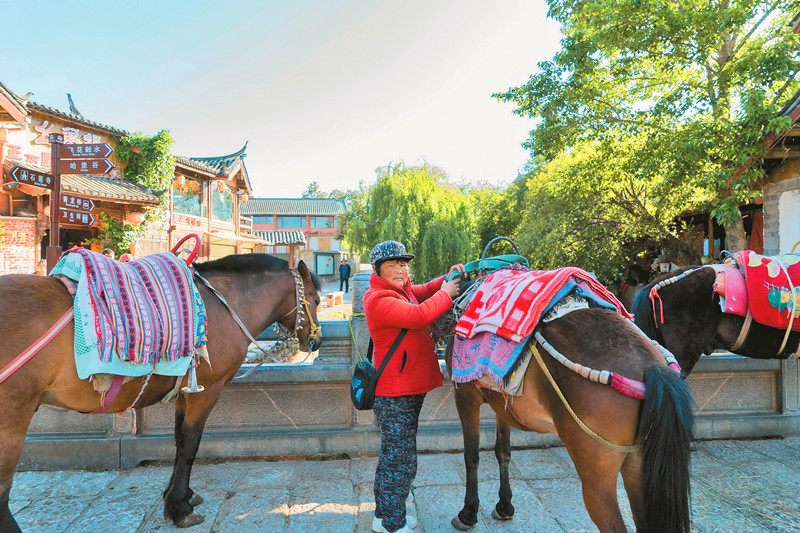Enjoying the Naxi ancient music in Lijiang

Shuhe, located in Lijiang city in northwest Yunnan province, is an old town with over a thousand years of history. It is widely considered one of the earliest settlements of the Naxi people in this region and also the most intact town that still stands along the renowned Tea-Horse Road between Yunnan and Tibet. In order to better protect cultural heritages and provide a platform where local ethnic cultures can survive and be displayed, a cultural exhibition area named Haligu has been established under the support of the Municipal Government of Lijiang. And now, it has become the place where tourists can have a real taste of the authentic Naxi culture.
Listening to the Naxi ancient music
Stepping into the Haligu Cultural Exhibition Area in Shuhe, Lijiang, one might be fascinated by a great number of traditional residences of the Naxi ethnic minority group lining up along streets and the crystal-clear streams flowing through the old town. In a pavilion near the center of the town, a group of elderly people play the Naxi folk music for tourists by instruments in their hands. Li Yongguang, who is in his seventies, has merged himself in what in plays, enjoying the peacefulness and solemnness expressed through the music.

Li Yongguang told reporters that he was once a Chinese teacher, and now after retirement, he spends almost all his time on playing the Naxi ancient music. Since 2017, he has been playing the pipa, a Chinese styled four-stringed lute, with a group of friends.“Although we are no longer young, none of us can forget about our dream of music,” Li said. “Every time we have chance to introduce our Naxi ancient music to visitors and tourists, we just feel very proud and honored, because it is a heritage, and something has been carried by our blood.”
Naxi ancient music, till now, remains a strict rule of inheritance that passes throughout generations. Musical skills can only been taught to appointed students by masters, and all classes need to be conducted in private forms. “This is the way that our Naxi ancient music has to be taught and learned,” said Li Yonguang. “I learned the music with my father when I was a little kid, but I cannot remember which generation of inheritors I belong to.”

Today, there are more than 20 elderly people playing the Naxi ancient music inside the Shuhe old town on a daily basis, and the majority of them are in their sixties. “As more and more tourists and visitors flock to Shuhe, we are able to gain some more money by playing music in the town. Apart from this, some young people who want to make a living by playing traditional instruments have also joined us in recent years,” Li Yongguang told us. “To me, they are the future and new hope for our Naxi ancient music.”
The dynamics of ancient town
Strolling in Shuhe, one can always see streams flowing through in this ancient town. In fact, water takes a very special role in shaping the sceneries and landscapes around Shuhe. It may even be argued that Shuhe can no longer be what it is without the presence of streams and rivers. According o Bai Zhiyuan, the curator of Shuhe Museum, there are several rivers running down to Shuhe from mountains nearby, encompassing Jiuding river, Qinglong river, Shu river.
Rivers and streams have not merely brought liveliness to the town, they are essential to the life of local residents there. While walking in Shuhe, you might constantly find Naxi women washing clothes or cooking along rivers. In addition, water from these rivers has also been used to take dust and trashes away and keep the entire town clean.

Unlike some touristic sites which have been highly commercialized, Shuhe is a dynamic and bustling old town with many local dwellers still living inside. What you may encounter in the streets are local vendors selling fresh fruits and vegetables to residents. And at street corners, there are Naxi ladies making Lijiang baba, a traditional flatbread usually consumed by the locals as breakfast. In Shuhe, Lijiang baba is deep-fried in a wok until it turns golden brown, and it is normally served hot and fresh with some chili paste. It has been regarded by both locals and tourists as one of the most authentic food of Lijiang.
Apart from tasting delicious local food, tourists and visitors can also have a glimpse of the caravan culture on the so called “Tea and Horse Road”. The Tea-Horse Road is a tough ancient trade route traversing through the mountainous areas of southwest China which connects today’s Yunnan, Sichuan and Tibet together. Shuhe, in particular, was a key commercial hub on this important trade route in the history. Today, tourists are able to take unforgettable tours and enjoy the beauty of Shuhe old town on horseback.

Along with the development of tourism, more opportunities have been brought to the town of Shuhe. Li Shanshan, a local young lady, has recently turned her house into a place for agrotourism. And in the meantime, she has been learning English in order to communicate with foreign tourists. “About 10 years ago, my family could only earn less than 10,000 yuan per year. But since we start our business, our annual household income has spiked to nearly 100,000 yuan,” she said. “And more importantly, many local residents have realized how ethnic culture and history mean to our life. They are the real treasures of us.”
Writing by Duan Jianxin; trans-editing by Wang Jingzhong; photographs by Liu Jiatong